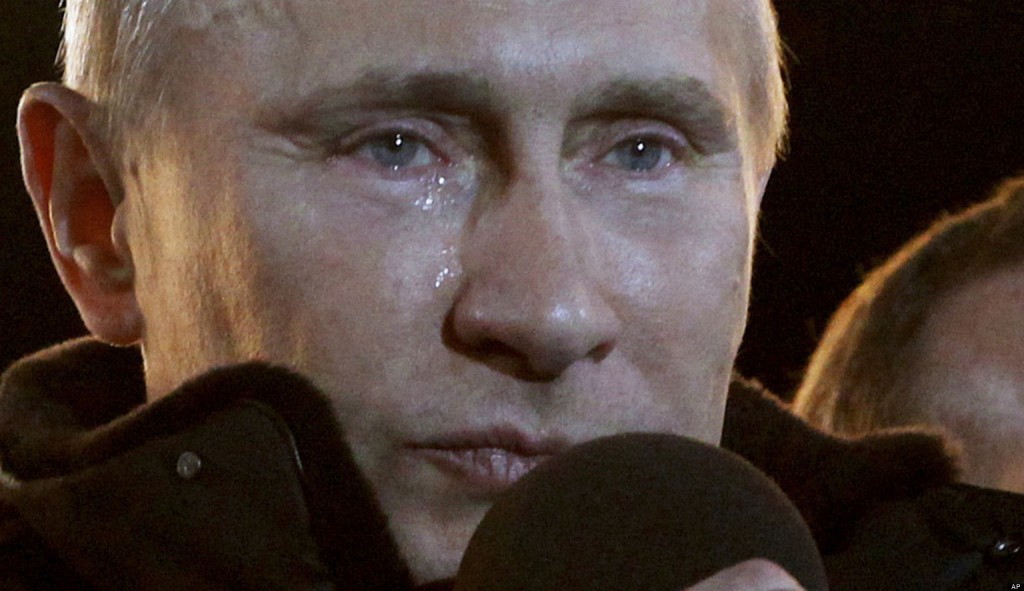There are no words to describe the vileness of the video beheadings of two American journalists by ISIS, but I have no doubt that they’re meant to get us to overreact, à la 9/11, and rush off again without a strategy. ISIS is awful, but it is not a threat to America’s homeland.
I am all for bombing them whenever we find an opportunity, like we do with Al-Queda. But I will not accept any new ground invasion or war to go after them. To put it bluntly, we cannot afford another land war in Asia for the next 100 years. Both monetarily and morally. If John McCain is so desparate to fight, he is free to join the Iraqi Army and take up arms. And he is free to encourage his sons to do so.
What concerns me more is this:
“As Ukrainian leaders warned on Monday of ‘a great war’ with Russia, NATO leaders meeting in Wales this week were expected to endorse their most concrete response yet to increased Russian military intervention in Ukraine: establishing a rapid-reaction force capable of deploying quickly to Eastern Europe[.] The new force of some 4,000 troops, capable of moving on 48 hours’ notice, will be supported with logistics and equipment pre-positioned in Eastern European countries closer to Russia, with an upgraded schedule of military exercises and deployments that are intended to make NATO’s commitment of collective defense more credible and enhance its deterrence.”
World War III just became 50% more likely to happen in the next two years. You see, Russia’s belligerence is really all about its position in the world, or more accurately, how it sees itself in the world. To most, it is a corrupt and fascist obligary with only nominal nods to democracy and the free market, which, absent its nuclear weapons, would be a second or third world power at best. Russia, on the other hand, sees itself as a former grand empire that is entitled to recapture that status through any means necessary. Which is why it sees NATO as such a threat.
When Russia was rebuilding in the 90’s after the fall of the Soviet Union, the one thing that was antagnostic in the relationship between the West and Russia was the issue of NATO expansion.
And as you can see, NATO did expand into the Baltics, into the Balkans, into Poland, and into Romania and Bulgaria. And we are talking a rapid reaction force that can be deployed to…. well the article does not state it, but the assumption is into the Ukraine.
How will Russia (Putin) react? Allegedly, Putin told EU President Jose Manuel Barroso that he could “take Kiev in two weeks.” Marc Champion thinks Putin is serious.
Earlier this year it was only those on the lunatic nationalist fringe in Moscow who talked about taking Kiev. Now it’s Putin. This is part of a disturbing pattern. For a long time, only ultranationalists talked about a place called Novorossiya, or New Russia. In April, Putin took that up, and by June the separatists in Ukraine had merged their self-proclaimed republics to found Novorossiya. So what are the Russian lunatics talking about now? Ethnic cleansing of Ukrainians in Novorossiya, and attacking Poland and the Baltic states.
Jonah Shapp at Andrew Sullivan’s The Dish:
We would not be where we are if Western leaders had not chosen to ruffle Russian feathers by inching the NATO umbrella steadily eastward since the end of the Cold War. That is not the same as saying that this is all America’s fault, but it does acknowledge the basic facts that actions have consequences, that countries tend to respond rationally to real or perceived threats, and that Putin had every reason to believe that Ukraine would eventually join NATO absent some kind of Russian intervention. Putin’s ethno-religious and political ideologies should be judged independently on their merits (or lack thereof), but his belief that the Cold War never ended is readily borne out by NATO’s expansion, as well as other signs, such as the IMF’s misguided handling of post-Soviet Russia in the 90s.
The cold war never ended according to Russia. And yet, they are not fighting the cold war the same way anymore, and we, the West, are going to have to find a new way to combat and deter Russia other than military threats. Consider this from Matthew Gault:
It’s no wonder that Latvia and other Baltic area NATO countries asked the alliance to deploy more troops within their borders—and NATO agreed. Secretary General Anders Fogh Rasmussen told The Guardian that NATO would build more bases in Eastern Europe. But new bases and extra troops will do little to deter maskirovka [the term for the allegedly unaffiliated Russian terrorists popping up in Eastern Ukraine]. If Russia can badly undermine a country without actually invading—withholding direct military force until the conditions are just right—then NATO troops could end up just standing around while the society around them disintegrates. The collapse could slowly render a traditional allied military presence politically unsustainable—it might look like an occupation—while simultaneously giving Russia an excuse to eventually send in “peacekeepers” whose true intentions are anything but peaceful. That’s how 21st-century maskirovka beats dated Cold War thinking.
